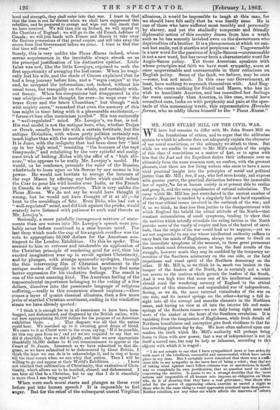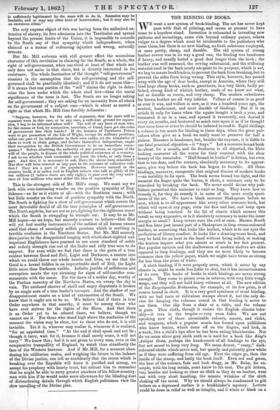MR. JOHN STUART MILL ON THE CIVIL WAR. have had occasion to differ with Mr. John Stuart Mill on
the foundations of ethics, and to argue that the utilitarian system to which he adheres does not adequately explain the character of our moral convictions, or the solemnity we attach to them. But while we are unable to assent to Mr. Mill's analysis of the origin of this class of convictions as a matter of tact, or to agree with him that the Just and the Expedient derive their influence over us ultimately from the same common root, we confess, with the greatest pleasure, that there are few living writers who seem to have a more vivid practical insight into the principles of social and political justice than Mr. Mill; few, if any, who feel more keenly, and express with greater power, the practical distinction between the immutable law of equity, *so far as huMan society is at present able to realize
and grasp it, and the mere expediencies of rational calculation. The essay which Mr. Mill has just contributed to the current number of Fraser's Magazine is marked by a singularly fair and lucid exposition of the true' ethical issues involved in the outbreak of the war; and if, as we think, he does less than justice to the disappointment with which England has beheld the actual attitude of the North—that constant. accumulation of small symptoms, tending to show that the motives which actually stimulate the ruling faction in the North partake more of the vanity of empire and less of the hatred of servitude, than the origin of the war would lead us to suppose,—yet we are not ungrateful to any one whose intellectual authority suffices to carry back the minds of Englishmen, always too prone to dwell on the immediate symptoms of the moment, to those great permanent forces which must determine, more or less, the final results of the struggle, however much they may be modified by the temporary necessities of the Southern aristocracy on the one side, or the fatal impatience and venal spirit of the Northern democracy on the other. If Mr. Mill is, as we think he is, much too lenient to the temper of the leaders of the North, he is certainly not a whit too severe to the motives which govern the leaders of the South. And it was high time that some one of his intellectual eminence' should recal the wandering memory of England to the ethical character of this shameless and unparalleled war of independence. Seeing, as we do, the mere external vicissitudes of the war on one side, and its inward springs on the other—having a full insight into all the corrupt and anarchic elements in the Northern cause, and having no view at all into the interior life and mainsprings of the Southern cause—we are daily losing sight more and more of the canker at the heart of the Southern revolution. It is vanishing from the imagination of Englishmen, while fresh details of Northern boastfulness and corruption give fresh vividness to that far less revolting picture day by day. We have often enforced upon our readers the truth which Mr. Mill's authority will perhaps bring home to them with new power, that a war of independence is not itself a sacred one, but may be holy or infamous, according to tht
objects with which it is waged :
"I do not scruple to say that I have sympathised more or less ardently with most of the rebellions, successful and unsuccessful, which have taken place in my time. But I certainly never conceived that there was a sztificient title to my sympathy in the mere fact of being a rebel ; that the') act of taking arms against one's fellow-citizens was so meritorious in itiaelf, was so completely its own justification, that no question need be eisked concerning the motive. It seems to me a strange doctrine that the most serious and responsible of all human acts imposes no obligation on,(those who do it of showing that they have a real grievance ; that those who rebel for the power of oppressing others, exercise as sacred a riight as those who do the same thing to resist oppression practised upon theneselves. Neither rebellion, nor any other act which affects the interests of others,
is sufficiently legitimated by the mere will to do it. Secession may be laudable, and so may any other kind of insurrection ; but it may also be an enormous crime."
The only express object of this war having been the unlimited extension of slavery, its free admission into the Territories and spread beyond the present limits of the Union, it is impossible to concede to the South any of that sympathy which independence, when claimed as a means of redressing injustice and wrong, naturally arouses.
But Mr. Mill enforces with still greater effect the anomalous character of this revolution in claiming for the South, as a whole, the right of self-government, when one-third at least of that whole not only does not unite in that claim, but is directly interested in its resistance. The whole fascination of the thought "self-government" consists in the assumption that the self-governing and the selfgoverned shall be practically identical ; and if it do not mean this— if it nieans that one portion of the " self " claims the right to determine the laws under which the whole shall live—then the moral significance of the term is lost. The South are no longer asking for self-government ; they are asking for an immunity from all check on the government of a subject race—which is about as sacred a right as that which Mr. Mill thus forcibly delineates :
"Suppose, however, for the sake of argument, that the mere will to separate were in this case, or in any case, a sufficient ground for separation, I beg to be informed whose will ? The will of any knot of men who, by fair means or foul, by usurpation, terrorism, or fraud, have got the reins of government into their hands ? If the inmates of Parkhurst Prison were to get possession of the Isle of Wight, occupy its military positions, enlist one part of its inhabitants in their own ranks, set the remainder of them to work in chain gangs, and declare themselves independent, ought their recognition by the British Government to be an immediate consequence? Before admitting the authority of any persons, as organs of the will of the people, to dispose of the whole political existence of a country, I ask to see whether their credentials are from the whole, or only from a part. And first, it is necessary to ask, Have the slaves been consulted ? Has their will been counted as any part in the estimate of collective volition? They are a part of the population. However natural in the country itself, it is rather cool in English writers who talk so glibly of the ten millions (I believe there are only eight), to pass over the very existence of four millions who must abhor the idea of separation."
This is the strongest side of Mr. Mill's essay. We must say we look with ever-increasing wonder on the positive sympathy of Englishmen—so far as it exists at all—with the Southern cause ; with but little wonder on the want of positive sympathy with the North. The South is fighting for a show of self-government which covers the most detestable denial of all the true principles of self-government. The North might be, but are not as yet, fighting for the righteous cause which the South is struggling to trample out. It may be as Mr. Mill hopes—as we hope, but scarcely venture to believe—that God will yet find worthy instruments of the noblest of all human causes amid that chaos of seemingly selfish passions which is seething in terrible confusion in the Northern States. But Mr. Mill scarcely does justice to the disappointed longing with which short-sighted and impatient Englishmen have yearned to see some standard of noble and orderly strength rise out of the limbo and rally true men to its support. For even while we feel that there is the germ of a true contest between Good and Evil, Light and Darkness, a contest into which we could throw our whole hearts and lives, we see that the Good is a kernel hidden in an impenetrable shell of Evil, the Light little more than Darkness visible. Infinite jumble of selfishness and corruption meets the eye straining for signs of self-sacrifice commensurate with the cause. For the dawn of a nobler day, worthy of the Puritan ancestry of the Northern States, we sweep the sky in vain. The confused chatter of shrill and angry disputants is broken by no single note of a true leader's trumpet. And the shadow of our disappointment reacts as a kind of extenuation of the South. We know that it ought not to be so. We believe that if there is true Order anywhere in that anarchy, it must be among those who have ever striven for the rights of the Slave. And that there is an Order yet to be educed there, we believe, though we cannot see it. For those who stand high above the confusion of the moment the vision may be clear, but to those who do not, it is still invisible. Yet it is, whoever may realize it, whenever it is realized, "for an appointed time." "At the end it shall speak and not lie; though it tarry, wait for it, because it shall surely come, it will not tarry." We know this; but it is not given to every man, even in the comparative tranquillity of England, to watch thus steadfastly the face of the Western heavens. And if Mr. Mill, for a moment abandoning his utilitarian scales, and weighing the future in the balance of the Divine justice, can tell us confidently that the storm which is breaking over the Republic will leave it purified and strong, we accept his prophecy with hearty trust, but entreat him to remember that he might be able to carry greater numbers of his fellow-countrymen with jiim if he would make more allowance for the blinding dust of dishear ning details through which English politicians view the slow unro4ling of the Divine plan.































 Previous page
Previous page